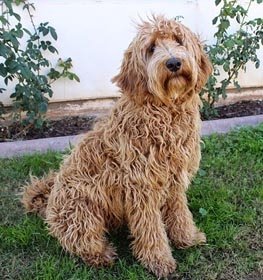Daisy Dog Information & Dog Breed Facts
Collection of all the general dog breed info about Daisy Dog so you can get to know the breed more.
| Group | Designer Dogs |
|---|---|
| Popularity Rank | 1268 |
| Reviews | 0 |
| User Ratings | |
|
Compare the Daisy Dog With Other Dogs
Select at least one dog breed to make the comparsion. | |
 | |
| Origin | |
|
Breed Classification
What type of dog breed is a Daisy Dog? Learn about its genetic classification and breeding category. | Cross Breed Poodle and Shih Tzu mix |
|---|
|
Size Classification
What size category is a Daisy Dog? Learn how big the Daisy Dog breed typically grows. | Small |
|---|---|
|
Weight Statistics
How much does a Daisy Dog weigh? Discover typical weight ranges for adult males and females of the Daisy Dog breed. | 9–16 pounds (4-7 kg) |
|
Average Weight
What is the average weight of a Daisy Dog? | 12.5 pounds (5,5 kg) |
|
Height
How tall is the Daisy Dog? Daisy Dog height: | 8-11 inches (20-28 cm) |
|
Average Height
What is the average height of a Daisy Dog? | 9.5 inches (24 cm) |
|
Price Range
How much does a Daisy Dog puppy cost? Find current market prices and factors affecting Daisy Dog costs. | $800-$1200 If you choose to purchase the Daisy Dog, you should know that the mentioned amount of money is an average of the collected data from breeders’ sites and puppy finder places. If you have a Daisy Dog for sale, please advertise it on a reliable website to make sure the Daisy Dog gets to a happy place. |
|---|---|
|
Availability
How easy is it to get a Daisy Dog? How many Daisy Dog are there in the world? | Very frequent: The Daisy Dog is quite easy to get. There is a risk of overbreeding, as it is an extremely popular breed. Inbreeding is common because of its popularity. A new study suggests that inbreeding contributes to the incidence of disease and health problems. So be careful, buy from a trustworthy place or kennel and seek the help of an experienced person, a professional, to make the right decision. |
|
Intelligence Rating
How intelligent is a Daisy Dog? Discover the Daisy Dog's intelligence ranking and learning capabilities. | Average: It takes patience to teach this breed any tricks or commands, but the effort is worth it. They understand and remember new commands after an average of 25-40 repetitions.
The Daisy Dog ranks average in the intelligence ranking of dogs. |
|---|---|
|
Training Difficulty
How easy is it to train a Daisy Dog? Learn about the Daisy Dog's trainability and response to training methods. | Daisy Dog dogs are easy to train. They find out the association between commands and actions quite quickly. |
|
Watchdog Rating
How good is a Daisy Dog as a watchdog? Learn about the Daisy Dog's alertness and guarding instincts. | Daisy Dog dogs are good watchdogs. Their main job is to observe and they're consistent in their effort. Good vocal cords and a sense of hearing belong to them. Usually, they're territorial and protective about their property, so the Daisy Dog dogs will alert you if they sense something different.
|
|
Territorial Protection
Is a Daisy Dog protective of its territory? Learn about the Daisy Dog's guarding instincts and behavior. | Daisy Dog dogs strongly protect their territory. This breed is a complete security guard, so you don't have to be afraid in case of danger. |
|
Personality Traits
What personality does a Daisy Dog have? Learn about characteristic Daisy Dog temperament and behavior traits. | ActivePlayfulHappyAlertCourageousIntelligentFriendlyOutgoingLivelyGentleTrainableFaithfulInstinctual |
|---|---|
|
Sensitivity Level
How sensitive are they? Daisy Dog sensitivity: | They are a little bit more sensitive than other dog breeds. Soft punishment affects them emotionally. Daisy Dog dogs don't tolerate irregular daily routines, noisy households, and frequent guest visits really well.
They are receptive to their owner's emotions and make wonderful family companions. |
|
Affection Level
How affectionate are they? Is a Daisy Dog a good family dog? | High: Daisy Dog dogs are genuinely loyal, soft and gentle, loving, and affectionate dogs toward their handlers. They enjoy quality time with their owners despite the activity and are considered great therapy dogs for those in need. This breed responds strongly to their handler's emotions because they bond closely. Their happiness is your happiness. |
|
Social Needs
How much social interaction does the Daisy Dog need? Daisy Dog social needs: | Daisy Dog dogs need a lot of social interaction. They desire to always be with someone or around people. This breed hates being left alone. |
|
Impulse to Wander or Roam
How likely is the Daisy Dog to run away? Does this breed explore or wander a lot? Does Daisy Dog roam? | Daisy Dog dogs have average wanderlust potential. Sometimes they like to explore the world and they might escape once or twice, but usually, they prefer staying safely at home. Safer to teach them how to get back to you on command. |
|
Prey Drive
Do this canine have a strong prey drive? Does Daisy Dog have high prey drive? | Daisy Dog dogs have an average prey drive, which means that they don't have a high impulse to chase and catch something like a cat or any other small aminals, but it might happen. Training can help to achieve good behavior. |
|
Barking Frequency
Does a Daisy Dog bark a lot? Learn about typical Daisy Dog vocalization patterns and triggers. | A lot: Daisy Dog is a particularly loud breed. They often enjoy barking and howling loudly. If you want a quiet dog, not the best choice.
The main triggers for barking are fear, attention, alarm, boredom, greeting, separation anxiety, compulsive barking, and defense. |
|---|---|
|
Playful Nature
How playful is a Daisy Dog? Understand the typical play drive and energy level of the Daisy Dog breed. | Average: Daisy Dogs, like any other dog breed, like playing. Sometimes they bark in excitement for playing, but they are not the most playful dog breed. |
|
Apartment Adaptability
Can a Daisy Dog live in an apartment? Learn about the Daisy Dog's suitability for apartment living. | Very house-friendly dog the Daisy Dog breed. It's good if you have a small garden where he can go out and do his business, but it's not important at all. You can get enough exercise with one or two walks a day, so keeping them indoors shouldn't be a problem. |
|
Lifestyle Adaptability
How adaptable is a Daisy Dog to lifestyle changes? Learn about the Daisy Dog's flexibility to new situations. | Daisy Dog dogs adapt very well to lifestyle changes and basically all living environments. They don't mind moving from one place to another with their owner. |
|---|---|
|
Alone Time Tolerance
Can a Daisy Dog be left alone? Learn about the Daisy Dog's tolerance to solitude. | Daisy Dog dogs tend to have separation anxiety when their owners left them alone at home because they bond very closely with them. |
|
Bite Risk Assessment
What is a Daisy Dog biting potential? Learn about the Daisy Dog's bite risk factors. | Low 🔽 The Daisy Dog has a low chance of biting somebody. Top reasons for dog bite: protection, pain, excitement, herding instinct, being provoked. (Data based on the available online bite statistics.) |
|---|---|
|
Mouthing Tendency
Is a Daisy Dog mouthy? Learn about the Daisy Dog's tendency to use mouth during play. | Daisy Dog dogs have a higher than average tendency to nip, chew, playbite, or herd people. It's a common habit during puppyhood, not aggressive behavior. These "bites" don't hurt, but Daisy Dog dogs need to be taught a good attitude. |
|
Bite Strength Rating
How strong is a Daisy Dog bite? Learn about the Daisy Dog's bite force measured in PSI. | Between 200 and 400 PSI ⏺ Daisy Dog bite force: Ordinary. Bite force Daisy Dog measurements typically fall within the range of 200 to 400 PSI. The bite force of a Daisy Dog is considered ordinary when compared to other dog breeds, but it is still quite powerful. This Daisy Dog bite force PSI can cause bite wounds. Daisy Dog bite PSI is not something that should be feared if the dog is well-trained and managed. To avoid any issues, it's essential to learn how to train a Daisy Dog puppy not to bite from an early age.
The Daisy Dog, and many others, have a fearsome presence because they have significant jaw strength, so it is important not to anger the dog and have it around strangers until it is fully trained. However, they are usually quite calm and good companions, they work well in families and are easy to care for. In conclusion, while the Daisy Dog bite force is certainly an interesting aspect of the breed, it is important not to let it overshadow the many other reasons why these dogs are so loved and respected. With proper training and socialization, a Daisy Dog can be a loyal and protective companion for your family. |
|
Average Lifespan
How long does a Daisy Dog live? Learn about the typical lifespan of the Daisy Dog breed. | 10-16 years The average lifespan of Daisy Dog: 13 years |
|---|---|
|
Climate Tolerance
How well does a Daisy Dog handle different weather? Learn about the Daisy Dog's climate adaptability. | Tolerates warm and cold weather Dogs that tolerate hot and cold weather are typically those that have a double coat of fur. Dogs with a double coat of fur have a layer of fur that insulates their skin and helps protect them from the cold and the heat. |
|
Health Concerns
What health issues are common in a Daisy Dog? Discover typical conditions affecting the Daisy Dog breed. | The Daisy Dog is a healthy breed, but there are certain health issues that you should check with your vet regularly. |
|
Vet Care Frequency
How often does a Daisy Dog need vet visits? Learn about the Daisy Dog's veterinary care requirements. | Average The Daisy Dog should have a complete physical check-up at least once per year. If your dog shows any symptoms, call your veterinarian. |
|
Health Problems
What genetic/health problems does the Daisy Dog breed have? What are the health issues and concerns of the Daisy Dog breed? Most common health risks of Daisy Dog: | Cataracts Hip Dysplasia Legg-perthes DiseasePatellar LuxationAllergiesHypothyroidismProgressive retinal atrophy (PRA)Umbilical HerniasVon Willebrand's DiseaseBloatEpilepsySebaceous AdenitisEar InfectionsDistichiasisAddison's DiseasePortosystemic Liver ShuntBladder StonesEctopic CiliaReverse SneezingCushing's SyndromeDry EyeRunny EyesCanine Atrial Septal Defect (asd)Neonatal Encephalopathy (news)Optic Nerve HypoplasiaPremature GrayingProptosisJuvenile Renal DysplasiaKeratitisRetained Baby TeethSnuffles |
|
Energy Rating
How energetic is a Daisy Dog? Understand daily activity needs of the Daisy Dog breed. | Daisy Dog dogs have an average energy level, so if you live a semi-active life, this breed can be a good choice for you. |
|---|---|
|
Activity Requirement / Exercise Need
How much exercise does a Daisy Dog need? How much exercise do Daisy Dog dogs require per day?
Do Daisy Dog dogs need a lot of exercises? | Daisy Dog dogs have an average exercise need. This breed is satisfied with short walks every weekday and a long ones on weekends. |
|
Sleeping Need
How much sleep does the Daisy Dog breed need? | Daisy Dog dogs sleep 12-14 hours a day as an average dog and they're not considered a lazy breed. |
|
Obesity Tendency
Is a Daisy Dog prone to weight gain? Learn about the Daisy Dog's obesity risks. | Average to High: If you don't pay attention to the Daisy Dog's weight, he can easily gain weight. More than one daily walk should be on schedule. To make your dog happy and fit, feed him with quality dry dog food and live an active life together. Try to find the happy medium between exercise and feeding.
If you notice any weight gain, consult your veterinarian and make a diet plan. Reduce unhealthy food and snacks, and measure the Daisy Dog weight regularly. |
|---|---|
|
Food Consumption
How much food does a Daisy Dog need daily? Learn about the Daisy Dog's feeding requirements. | 2 to 3 cups of high-quality dry food a day, divided into two meals. |
|
Allergy Friendliness
Is a Daisy Dog hypoallergenic? Learn about the Daisy Dog's suitability for allergy sufferers. | Yes Daisy Dog dogs do well with allergy sufferers by causing fewer allergic reaction. However there are no 100% hypoallergenic dogs in the world, there are a variety of breeds that are considered to reduce or minimize the possibility of an allergic response. Coat type isn't necessarily relevant, because most people are allergic to dander (flakes on the dog's skin) or saliva, not actually to dog hair. |
|---|---|
|
Coat Colors
What colors does a Daisy Dog come in? Discover all possible Daisy Dog color variations. | BlackGray Red Blue Cream White SilverBrownFawn Brindle LiverGoldBeige Apricot |
|
Grooming Requirements
How much grooming does a Daisy Dog need? Learn about Daisy Dog coat maintenance requirements. | Professional: This breed needs a lot of work to keep in good condition. The Daisy Dog requires grooming on a daily basis.
Cutting the dog's hair by a professional groomer is essential. Everyday brushing of the dog's coat is necessary to reduce shedding. Ears and eyes should be cleaned regularly to avoid infections. Don't skip the seasonal flea treatment too. Dog nail trimming and dog bath should be on a weekly schedule. Taking good care of your Daisy Dog is time-consuming and requires excellent grooming skills. If you don't have the time and skill search for the best dog groomer or clipping service in your area and book an appointment. Maybe you're lucky to have a dog boarding service that includes grooming or walk-in dog bath places nearby. |
|
Drooling Tendency
Does a Daisy Dog drool a lot? Learn about the Daisy Dog's drooling habits. | The Daisy Dog is a perfect example of a very low drooling tendency. If you're disgusted by slobber spots on your clothes, the Daisy Dog could be a perfect choice for you. Drooling is the unintentional saliva flowing outside of the mouth. It can be completely normal or a sign of a health problem. Certain dog breeds drool minimum compared to others, just like the Daisy Dog.
If you notice any change in your dog's drooling habit, you should contact a vet as soon as possible. |
|
Stinkiness Rating
Does a Daisy Dog smell bad? Learn about the Daisy Dog's natural odor levels. | Medium ⏺ The Daisy Dog has an average chance of bad smell. Top reasons for dog stinkiness: infection of bad tooth/ear/skin folds, gas attacks. |
|
Coat Characteristics
What type of coat does a Daisy Dog have? Learn about the Daisy Dog's fur characteristics. | DenseCurly |
|
Bathing Needs
How often does a Daisy Dog need baths? Learn about the Daisy Dog's bathing requirements. | 4-6 weeks Average. Experts recommended at least every 4-6 weeks for this family pup. According to a study, 56% of pet parents don’t bathe their dogs as frequently as they should, and 60% use the sniff test when deciding when it’s bath time.
Bathing your dog is beneficial to them in more ways than just one. It’s also a good time to look for unusual scratches, bumps, fleas, and other irregularities. When their hair is wet and flat against their body, these details are more visible. |
|
Shedding Level
How much do Daisy Dog dogs shed? How to control, reduce and prevent the shedding of the Daisy Dog? Do Daisy Dog dogs shed a lot? | Daisy Dog dogs shed none to minimal. Having a puppy from this breed you don't have to be afraid of your couch or car being covered by dog hair. Daisy Dog dogs could be the best choice if you don't tolerate dog hair. |
|
Child Compatibility
Is a Daisy Dog good with children? Learn about the Daisy Dog's behavior around kids of different ages. | Daisy Dog dogs are kid-friendly dogs. This breed is a good choice if you have children. |
|---|---|
|
Pet Compatibility
How well does a Daisy Dog get along with other pets? Discover the Daisy Dog's compatibility with other animals. | Daisy Dog dogs are one of the friendliest dog breeds. |
|
Stranger Friendly
Are they aggressive or friendly towards/with strangers? Daisy Dog temperament with other people: | Daisy Dog dogs are stranger-friendly dogs. |
|
Cat Friendly
How well do Daisy Dog dogs get along with cats? Are they good with kittens? What is this fido's temperament with cats? Can they be good with cats? Can the Daisy Dog breed live with a cat? | Daisy Dog dogs are very cat-friendly dogs. |
|
Dog Friendly
Is Daisy Dog good with other dogs? Are they dog-friendly dogs? How well do Daisy Dog dogs get along with other dogs? | Daisy Dog dogs are very dog-friendly dogs. If you want more dogs in your family or you'd like to join dog meetups, the Daisy Dog can be a great choice. |
|
Good For First Time Owners
Is Daisy Dog breed good for first-time owners? Do they make a good dog for novice owners? Is Daisy Dog breed suitable for first-time owners? | Yes Daisy Dog dogs are good for novice owners, due to their easy-going personality. |
|
Office Friendly
Are Daisy Dog dogs good office canines? Do Daisy Dog dogs make good office-friendly pets? Can they be office dogs? | No Daisy Dog is not the best dog breed for office environment. |
|
Senior Citizens Friendly
Are they senior citizens friendly dogs? How well do Daisy Dog dogs get along with the elderly people? What is the Daisy Dog temperament with senior people? Are Daisy Dog dogs good for elderly owners? | Daisy Dogs are usually recommended for elderly people. |
|
Service Dog Capability
Can a Daisy Dog be a service dog? Learn about the Daisy Dog's service work potential. | Yes This breed makes good as a service dog. A service dog is a term used in the USA to refer to any type of assistance dog specifically trained to help people who have disabilities, such as visual impairment, hearing impairments, mental disorders, seizures, mobility impairment, and diabetes. Service dogs are protected under the ADA (Americans with Disabilities Act).
Daisy Dog breed is a good choice for service purposes. |
|---|---|
|
Therapy Work Suitability
Is a Daisy Dog good as a therapy dog? Learn about the Daisy Dog's therapy work aptitude. | Yes This breed makes a perfect therapy dog. A therapy dog is a dog that might be trained to provide affection, comfort, and love to people in hospitals, retirement homes, nursing homes, schools, hospices, disaster areas, and people with anxiety disorders or autism.
Daisy Dog breed is a good choice for therapeutic purposes. |
|
Scent Detection Ability
Is a Daisy Dog good at detection work? Learn about the Daisy Dog's scenting abilities. | Not really They are not typically employed for this type of work, but there may be exceptional cases. A detection dog or sniffer dog is a dog that is trained to use its senses (mostly its smell) to detect substances such as explosives, illegal drugs, wildlife scat, currency, blood, and contraband electronics such as illicit mobile phones.
Daisy Dog is not the best breed for detection purposes. |
|
Search & Rescue Potential
Can a Daisy Dog do search and rescue? Learn about the Daisy Dog's SAR capabilities. | Not really This dog breed is not typically used as a search and rescue dog. The use of dogs in search and rescue (SAR) is a valuable component in wilderness tracking, natural disasters, mass casualty events, and locating missing people.
The Daisy Dog is not the best breed for SAR purposes. |
|
Maritime Work Ability
Is a Daisy Dog good on boats? Learn about the Daisy Dog's maritime capabilities. | Yes Daisy Dog breed usually likes being on a boat. Boat dogs were typically bred for their strength, stamina, and water resistance, as they were often required to perform tasks such as pulling in fishing nets, and jumping into the water to retrieve ropes or lines, or helping to move cargo. Sailor dog is a type of dog that was bred to accompany sailors on their voyages. They were typically used for three purposes: as a working dog, as a watchdog, and as a companion. A boat dog is a term used to describe a type of dog that was traditionally bred and used as a working dog on boats. |
|
Draft Work Capability
Can a Daisy Dog pull carts? Learn about the Daisy Dog's drafting abilities. | Not really A drafting dog or draft dog is a dog bred and used for cart pulling. Dogs bred for this work have strong builds and qualities that are needed, strength and determination.
Daisy Dog is not the best breed for drafting purposes. |
|
Military Service Background
Was a Daisy Dog used in military service? Learn about the Daisy Dog's military history. | Not really In history, this breed was not really used for combat dog. |
|
Puppy Litter Size
How many puppies does a Daisy Dog usually have? Learn about typical litter sizes. | 2-5 puppies |
|---|---|
|
Pregnancy Duration
How long is a Daisy Dog pregnant? Learn about the Daisy Dog's gestation period. | 60-64 days Reproductive cycle of the female Daisy Dog: The first period called Proestrus lasts for about 9 days.
During this time the females start to attract males. You can notice by swelling vulva and bloody discharge. The second part is the Estrus when the female is receptive for the male. It lasts for about 3 to 11 days. The sign of the proestrus part is the soft and enlarged vulva. The discharge decreases and lightens in color. The third part is the Diestrus. Normally, it occurs around day 14. In this period the female’s discharge changes for vivid red and coming to its end. The vulva returns to average, and she will no longer permit mating. The fourth part called the Anestrus. The time frame between heat periods normally lasts about six months. |
|
Breeding Frequency
How often can a Daisy Dog have puppies? Learn about safe breeding intervals. | Once a year. More frequent breeding is not healthy. It is very important not to buy a dog from a puppy mill, where the needs of the pups and their mothers are ignored. It's an inhumane high-volume dog breeding facility, where puppies born several times a year. |
|
AKC Classification
What AKC group is a Daisy Dog in? Learn about the Daisy Dog's AKC classification. | Not recognized by the American Kennel Club. |
|---|---|
|
FCI Classification
What FCI group is a Daisy Dog in? Learn about the Daisy Dog's international classification. | Not recognized by FCI. |
Daisy Dog Pros and Cons
- Training Difficulty: Daisy Dog dogs are easy to train.
- Allergy Friendliness: Daisy Dog dogs do well with allergy sufferers by causing fewer allergic reaction.
- Apartment Adaptability: Very house-friendly dog the Daisy Dog breed.
- Shedding Level: Daisy Dog dogs shed none to minimal.
- Drooling Tendency: The Daisy Dog is a perfect example of a very low drooling tendency.
- Watchdog Rating: Daisy Dog dogs are good watchdogs.
- Lifestyle Adaptability: Daisy Dog dogs adapt very well to lifestyle changes and basically all living environments.
- Child Compatibility: Daisy Dog dogs are kid-friendly dogs.
- Cat Friendly: Daisy Dog dogs are very cat-friendly dogs.
- Dog Friendly: Daisy Dog dogs are very dog-friendly dogs.
- Senior Citizens Friendly: Daisy Dogs are usually recommended for elderly people.
- Good For First Time Owners: Daisy Dog dogs are good for novice owners, due to their easy-going personality.
- Service Dog Capability: This breed makes good as a service dog.
- Therapy Work Suitability: This breed makes a perfect therapy dog.
- Maritime Work Ability: Daisy Dog breed usually likes being on a boat.
Boat dogs were typically bred for their strength, stamina, and water resistance, as they were often required to perform tasks such as pulling in fishing nets, and jumping into the water to retrieve ropes or lines, or helping to move cargo.
Sailor dog is a type of dog that was bred to accompany sailors on their voyages.
- Grooming Requirements: Professional: This breed needs a lot of work to keep in good condition.
- Obesity Tendency: Average to High: If you don't pay attention to the Daisy Dog's weight, he can easily gain weight.
- Mouthing Tendency: Daisy Dog dogs have a higher than average tendency to nip, chew, playbite, or herd people.
- Alone Time Tolerance: Daisy Dog dogs tend to have separation anxiety when their owners left them alone at home because they bond very closely with them.
- Office Friendly: Daisy Dog is not the best dog breed for office environment.




